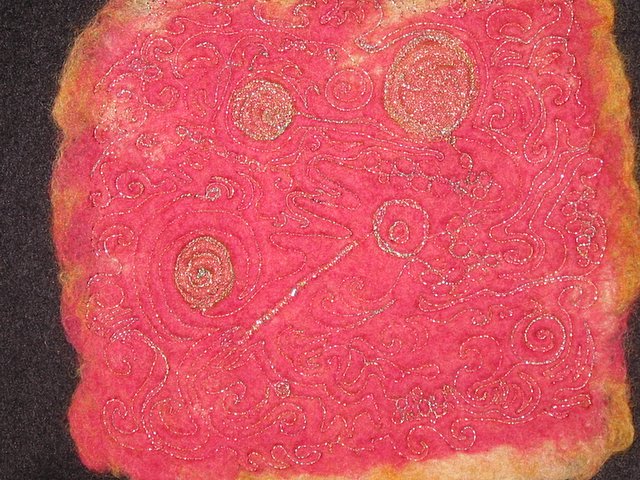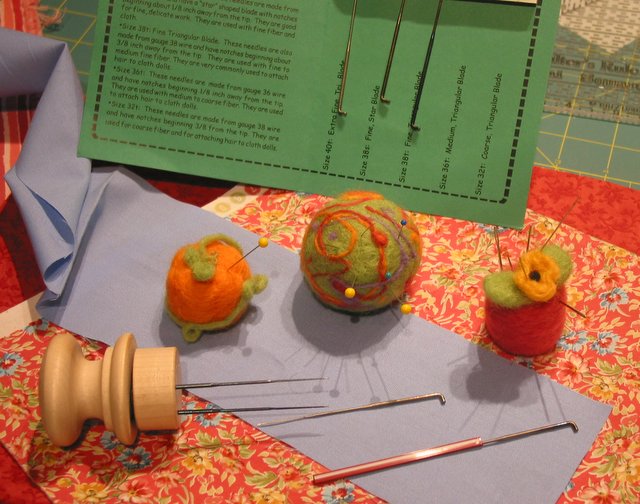I've been playing with the embellisher some this morning; yesterday, I did some wet felting. I haven't done any wet felting or hand needle felting for a year or two. Even then, I was just experimenting and didn't pursue it for long.
Here are some pincushions needle felted by hand when I first got my hand needles.
Journal quilt of a lion in the style of those used for the Chinese lion dance that was needle felted by hand then quilted in March 2006.
 And this is one piece of wet felting that I then free motioned over.
And this is one piece of wet felting that I then free motioned over. And this was needle felted by hand, then quilted and embellished for a still life challenge in 2005.
And this was needle felted by hand, then quilted and embellished for a still life challenge in 2005. Will take pictures of some of my experiments from yesterday and today and post them later, but I'm eager to hear of any hints or tips about using the embellisher...the instructions and possibilities included with the machine are extremely limited.
Will take pictures of some of my experiments from yesterday and today and post them later, but I'm eager to hear of any hints or tips about using the embellisher...the instructions and possibilities included with the machine are extremely limited.After reading this article about the importance of sleep, especially on children, my mind turned to MacBeth and his comment; he calls sleep the "Chief nourisher in life's feast" (2.2.35-39).
Here are a few excerpts from the article (emphasis is mine):
Using newly developed technological and statistical tools, sleep scientists have recently been able to isolate and measure the impact of this single lost hour [of sleep in children]. Because children’s brains are a work-in-progress until the age of 21, and because much of that work is done while a child is asleep, this lost hour appears to have an exponential impact on children that it simply doesn’t have on adults.
The surprise is how much sleep affects academic performance and emotional stability, as well as phenomena that we assumed to be entirely unrelated, such as the international obesity epidemic and the rise of Attention Deficit Hyperactivity Disorder. A few scientists theorize that sleep problems during formative years can cause permanent changes in a child’s brain structure: damage that one can’t sleep off like a hangover. It’s even possible that many of the hallmark characteristics of being a tweener and teen—moodiness, depression, and even binge eating—are actually symptoms of chronic sleep deprivation.
andWith the benefit of functional MRI scans, researchers are now starting to understand exactly how sleep loss impairs a child’s brain. Tired children can’t remember what they just learned, for instance, because neurons lose their plasticity, becoming incapable of forming the synaptic connections necessary to encode a memory.
A different mechanism causes children to be inattentive in class. Sleep loss debilitates our body’s ability to extract glucose from the bloodstream. Without this stream of basic energy, one part of the brain suffers more than the rest: the prefrontal cortex, which is responsible for what’s called “executive function.” Among these executive functions are the orchestration of thoughts to fulfill a goal, the prediction of outcomes, and perceiving consequences of actions.and
Convinced by the mountain of studies, a handful of school districts around the nation are starting school later in the morning. The best known of these is in Edina, Minnesota, an affluent suburb of Minneapolis, where the high school start time was changed from 7:25 a.m. to 8:30. The results were startling. In the year preceding the time change, math and verbal SAT scores for the top 10 percent of Edina’s students averaged 1288. A year later, the top 10 percent averaged 1500, an increase that couldn’t be attributed to any other variable. “Truly flabbergasting,” said Brian O’Reilly, the College Board’s executive director for SAT Program Relations, on hearing the results.
Another trailblazing school district is Lexington, Kentucky’s, which also moved its start time an hour later. After the time change, teenage car accidents in Lexington were down 16 percent. The rest of the state showed a 9 percent rise.
and sleep and obesity:Three foreign studies showed strikingly similar results. One analyzed Japanese elementary students, one Canadian kindergarten boys, and one young boys in Australia. They all showed that kids who get less than eight hours of sleep have about a 300 percent higher rate of obesity than those who get a full ten hours of sleep. Within that two-hour window, it was a “dose-response” relationship, according to the Japanese scholars.
In Houston public schools, according to a University of Texas at Houston study, adolescents’ odds of obesity went up 80 percent for each hour of lost sleep.
The article is long and there is a link to another article, but both articles are well worth examining.


i got myself some felting needles a while back, i should try something,looks like so much fun.
ReplyDeleteI would love to see a tutorial on how you do that felting.
ReplyDeletelove the felting samples. Also am glad to have some insight regarding a correlation between periods of insomnia and my tendencies of distracting myself/completion issues. Maybe I will keep track of the cycles and see if that kind of attention makes them somehow less extreme (like they are right now ...)
ReplyDeletejude -- it is fun, but hand felting is hard on the fingers. I get careless and jab myself frequently! You can add fabric to fabric using the hand needles, though, as well as fibers, yarns, etc., and then embroider by hand or machine.
ReplyDeleteRian -- Are you talking about the wet felting or the needle felting? I think I'll do one of both; thanks for the suggestion.
acey -- While we all know that sleep is important to performance, I was surprised at the explanations of how much and why. I, too, am an insomniac so the article interested me for both my grandkids and myself. I also look for any excuse available for poor memory!
Love the felted pieces Jen.
ReplyDeleteWhat an interesting article! I've always been sleep deprived. Maybe that's my problem!
Deb - I'm almost always sleep deprived. If I can sleep 6-7 hours a night, I'm doing quite well. Even then, I'm waking up frequently.
ReplyDeleteIt would be nice to experience 8 hours of sleep each night, wouldn't it? Of course, with your nursing schedule, you don't have the option of regular hours.
given the significant positive effects - SAT scores, car accident rates and obesity - I am amazed that there isn't a outcry for all school districts to follow suit! unfortunately the start time of school systems are probably dictated not by what is best for the children, but what is most convenient for adults ...thanks for excepting the bits - I look forward to printing off the whole article and giving it a more thorough read!
ReplyDeleteyour experiments with the embellisher are wonderful! looks like you have mastered it! warm cuffs sure would be useful in my neck of the woods come winter! have to play around with making some. intrigued by the felting...
sorry you've been feeling poorly, but glad to read today's post indicating that you are feeling a bit better - OK is on the way...change of season always seems to be a difficult time. take care.
kimy -- I should email a copy of the article to all the local school systems. The bus schedules dictate too much...just as lunch schedules do. As a retired teacher, I've seen how school systems will spend exorbitant amounts of money on programs they abandon within a few years and fail to confront opposition to common sense ideas, but the article tackles such important issues that maybe some systems would respond.
ReplyDeleteThanks for the comment about the felting. I'm learning from my mistakes and am spending more time with the wet felting than with my new embellisher!